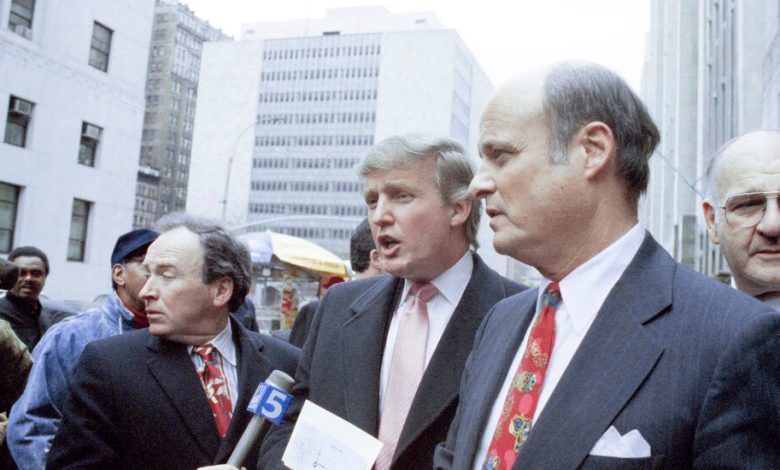Jay Goldberg, Tenacious Lawyer for Celebrities, Dies at 89

Jay Goldberg, a former boxer from Brooklyn who nimbly transmuted punches into punch lines that he wielded as a lawyer to defend celebrity clients including Donald J. Trump, Sean Combs, Willie Nelson, the Rolling Stones and a bevy of mobsters, died on Dec. 5 at his home in Bridgehampton, N.Y. He was 89.
His death was confirmed by his wife, Rema Goldberg..
“Jay was able to take a complex legal situation, greatly simplify it and win, or come to a fair conclusion,” Mr. Trump said in a statement after Mr. Goldberg’s death.
Mr. Goldberg relished his role as a gladiator, first as a 6-foot-2, 140-pound welterweight who retired when a knockout in the third round ended his 10-0 winning streak, and then as a “killer” in the courtroom. He once told the gossip columnist Cindy Adams that he could “rip skin off a body” and cause “physical pain on the stand.”
But as a curbstone comedian who occasionally filled in at the Copacabana nightclub in Manhattan (his aunt knew the owner) and who shared Mark Twain’s faith that a laughing jury seldom convicts, Mr. Goldberg also provoked his share of giggles.
When Matty (the Horse) Iannello, a New York sultan of smut and reputed member of the Genovese crime family, was accused in an extortion case of trying to intimidate one Andrew (the Hulk) Giordano, Mr. Goldberg, in his summation, produced a life-size cardboard cutout of the 6-foot-5, 350-pound Mr. Giordano, who had not been present at the trial, to dramatize to the jury who was in a position to intimidate whom.
Representing Mr. Trump, Mr. Goldberg posed on the courthouse steps in Lower Manhattan with a giant facsimile of a $10 million check to accentuate what he called Mr. Trump’s generous offer to settle a divorce lawsuit filed by his wife, Ivana Trump. (Mr. Trump eventually settled with a payment of $14 million in 1991.)
In a memoir, Mr. Goldberg described himself as Mr. Trump’s exclusive litigator from 1990 to 2005 and said he had won 10 cases for the developer and future president.
Once, a mobster whom he represented and who had pleaded guilty was about to be sentenced by a federal judge. As Mr. Goldberg stood beside his client in a packed courtroom, the judge asked whether the defendant “should suffer economic loss for his criminal activity.”
“I looked at the judge stoically,” Mr. Goldberg recalled. “‘Judge,’ I said, ‘I have taken care of that already.’”
In 1988, he was defending Carl A. Capasso, the New York City consumer affairs commissioner under Mayor Edward I. Koch, in a case involving alimony payments to his former wife. (By then Mr. Capasso had become the paramour of Bess Myerson, the former Miss America who led two New York City agencies, Consumer and Cultural Affairs.) Cross-examining the Capassos’ maid, who had testified to conversations that she said she had overheard, Mr. Goldberg asked:
“Do you enjoy listening to people when they masticate?”
The jurors gasped. The judge looked stunned.
“Whoa!” Mr. Goldberg interjected. “I said ‘masticate.’ It means ‘to chew.’”
Mr. Capasso was acquitted. Mr. Goldberg quoted the judge as saying, “Goldberg just laughed the case right out of the court.”
Not every case was played for laughs, although Mr. Goldberg usually got the last one.
His mobster client Joseph Gambino was acquitted after Mr. Goldberg subjected the Mafia turncoat Salvatore (Sammy the Bull) Gravano to withering questioning, posed so that Mr. Gravano was largely limited to yes-or-no responses, leaving him no leeway to offer his own narrative.
While everyone is entitled to a defense, Mr. Goldberg acknowledged, “I’m fairly certain that I never represented an innocent mobster.”
Jay Goldberg was born on Jan. 2, 1933, in Brooklyn. He described his father, Joseph, a wholesale apparel sales representative, as a loving father but a degenerate gambler. His mother, Lillian (Adler) Goldberg, was a homemaker.
After graduating from James Madison High School, he earned a degree in political science from Brooklyn College and then attended Harvard Law School, where he graduated magna cum laude in 1957. A member of the R.O.T.C., he was commissioned as an Army second lieutenant, discharged as a captain and retired as a lieutenant colonel.
In 1959, he married Regina Hochberg, known as Rema, a jury consultant. In addition to her, he is survived by their son, Justin; a daughter, Julie Maniha; and five grandchildren.
Mr. Goldberg was hired as an assistant to the Manhattan district attorney Frank S. Hogan. At Mr. Hogan’s recommendation, Attorney General Robert F. Kennedy appointed him as a special prosecutor to root out corruption in northwestern Indiana.
As a private defense lawyer, Mr. Goldberg attracted a long list of high-profile clients, including Miles Davis, Bono, Johnny Cash, the industrialist Armand Hammer, the Hells Angels, the financier Carl Icahn, former Representative Charles B. Rangel, the Manhattan Democrat, and the crime syndicate chief and banker Meyer Lansky.
He was the author of five books, including a memoir, “The Courtroom Is My Theater: My Lifelong Representation of Famous Politicians, Industrialists, Entertainers, ‘Men of Honor,’ and More” (2018, with Alex S. Huot).
He also wrote several manuals on how to prepare for trial, but told The New York Times in 1990 that his own formula was clear-cut:
“I say to myself at the start of a case: ‘What do I want the jurors to be saying to each other during deliberations? I want them to be able to grasp onto a reed. If I give them nothing to grasp, the case will sink. You have to have a theory: the simpler, the better.’”
In a Times interview in 1997, he stated the strategy even more starkly: “It’s theater in the courtroom. It’s the only place were you get to emote and try to convince juries that black is white.”